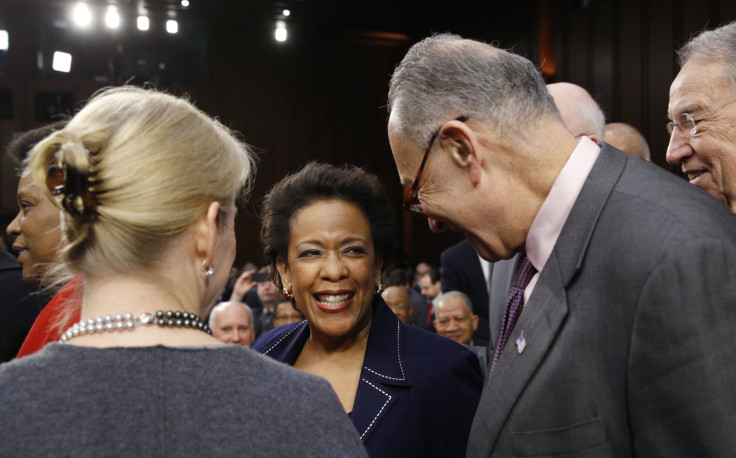Immigration Reform 2015: Obama Immigrant Actions Backed By Loretta Lynch During Attorney General Nomination Hearing

On the first of two days of her historic confirmation hearings, U.S. Attorney General nominee Loretta Lynch was grilled by the Republican-controlled Senate Judiciary Committee Wednesday on same-sex marriage, the legalization of marijuana, prison sentencing reforms and her similarities to her would-be predecessor, Attorney General Eric Holder. But it was President Barack Obama’s recent executive action on immigration, a flashpoint issue for the GOP, that dominated the hearing. If confirmed, Lynch would become the first African American woman to lead the Justice Department.
Lynch told the Senate panel that while she wasn't involved in advising Obama's executive actions -- an order offering millions of undocumented immigrants work permits and multiyear postponements of deportation proceedings -- "I don't see any reason to doubt the reasonableness of those views." GOP leaders have increasingly expressed frustration for months over the White House's immigration policies, with some suggesting that any tone deafness from Lynch could derail her confirmation.
The first questions on the immigration policy came at the top of the hearing from committee chairman Sen. Chuck Grassley of Iowa, who asked Lynch whether there was a legal framework for Obama's delayed deportation plan announced in November. "I have had occasion to look at the Office of Legal Counsel opinion through which the Department of Homeland Security sought legal guidance there, as well as some of the letters from constitutional scholars who've looked at the similar issue. And certainly it seems to be a reasonable discussion of legal precedent," Lynch said.
Alabama Sen. Jeff Sessions, one of the most aggressive of the Republican committee members at Wednesday's hearing, questioned whether legal issues would arise if immigrants who came into the country unlawfully were denied equal treatment by employers who preferred to hire American citizens. Lynch told Sessions he had raised an "important point" about the employment status of undocumented immigrants, but she did not directly answer the question, deferring it for further legal review. The "right to work is shared by everyone in this country regardless of how they came here," Lynch said. She later clarified that comment, saying she did not believe undocumented immigrants had the right to work in the U.S.
Lynch is best known for her work in the U.S. Attorney’s Office in the Eastern District of New York, where, among other accomplishments, she cracked down on American businessmen who exploited undocumented immigrants at a chain of convenience stores. In 2013, Lynch announced the arrests of several 7-Eleven store operators on charges including harboring dozens of immigrants, falsifying their identities and stealing their wages. “These [store operators] ruthlessly exploited their immigrant employees, stealing their wages and requiring them to live in unregulated boardinghouses, in effect creating a modern-day plantation system,” Lynch said in a statement announcing the charges. “As this case shows, we are committed to preserving the rule of law and protecting our communities from the abuses of corrupt businessmen seeking to gain illegal advantage."
Early outside reactions to Lynch’s first day before the Senate panel were divided. Wade Henderson, president and CEO of the Leadership Conference on Civil and Human Rights, said Lynch said all the right things to establish her credentials. “Loretta Lynch’s testimony today once again demonstrated the impeccable record, unwavering commitment to public service and thoughtful consideration of the issues,” Henderson said in a statement released Wednesday. “Her pledge to be an independent attorney general to protect and defend our Constitution, to safeguard our people, and to stand as the leader and public servant that they deserve shows the approach she will take to uphold the law for all Americans.”
Senator Jeff Sessions (R-AL) Questions on Immigration - http://t.co/BtO7eRU9wQ
- Nathan Hurst (@nathanhurst) January 28, 2015© Copyright IBTimes 2025. All rights reserved.






















